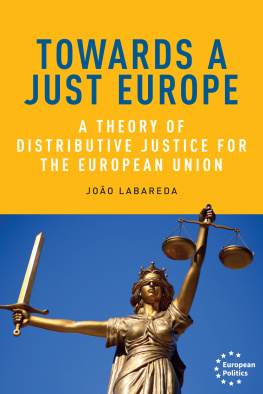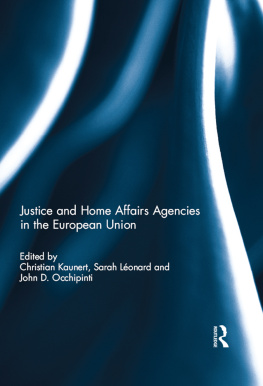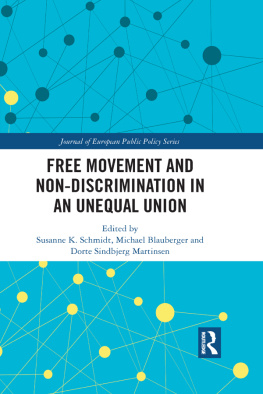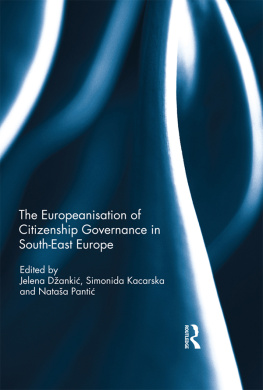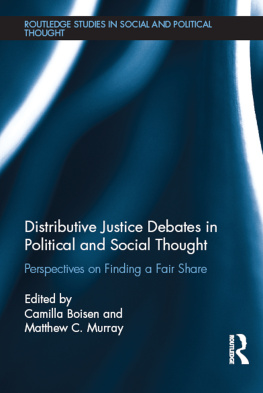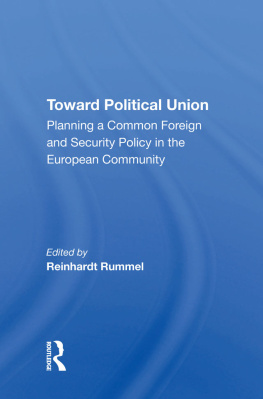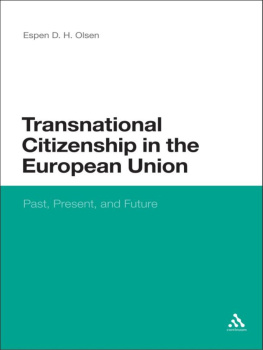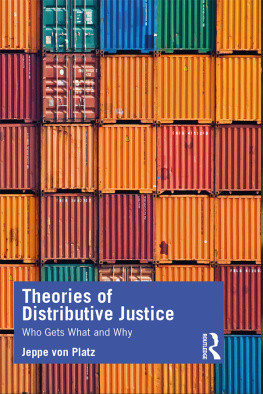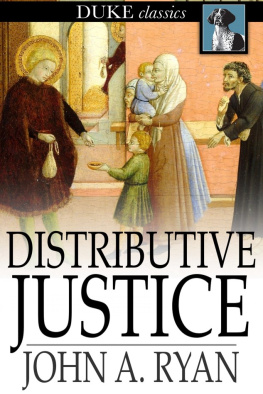Series Editors: Professor Dimitris Papadimitriou (University of Manchester), Dr Kathryn Simpson (Manchester Metropolitan University) and Dr Paul Tobin (University of Manchester)
The European Politics series seeks to tackle the biggest issues facing Europe in the twenty-first century.
Previously published under the European Policy Research Unit (EPRU) name, this long-established and highly respected series combines an important scholarly legacy with an ambitious outlook on European Studies at a time of rapid change for the discipline. Its geographical coverage encompasses the European Union, its existing and aspiring members, and wider Europe, including Russia and Turkey, and the series actively promotes disciplinary, theoretical and methodological diversity.
The editors particularly welcome critical scholarship on the politics and policy making of the European Union, on comparative European politics, and on contemporary issues and debates affecting the future of Europes socio-political and security outlook. Key areas of interest include Brexit, the environment, migration, identity politics and the ever-changing face of European integration.
Previously published:
Regulating lobbying: A global comparison, 2nd edition
Raj Chari, John Hogan, Gary Murphy and Michele Crepaz
Towards a just Europe
A theory of distributive justice for the European Union
Joo Labareda
Manchester University Press
Copyrigh Joo Labareda 2021
The right of Joo Labareda to be identified as the author of this work has been asserted by him in accordance with the Copyright, Designs and Patents Act 1988.
Published by Manchester University Press
Altrincham Street, Manchester M1 7JA
www.manchesteruniversitypress.co.uk
British Library Cataloguing-in-Publication Data
A catalogue record for this book is available from the British Library
ISBN 978 1 5261 5261 9 hardback
First published 2021
The publisher has no responsibility for the persistence or accuracy of URLs for any external or third-party internet websites referred to in this book, and does not guarantee that any content on such websites is, or will remain, accurate or appropriate.
Typeset
by Deanta Global Publishing Services, Chennai, India
Contents
I have received a great deal of help and support, without which this book would never have been completed. I am very grateful to Rainer Baubck, who supervised this research project with enormous dedication and enthusiasm. A very special thanks to Lea Ypi, Jennifer Welsh, and Andrea Sangiovanni, who provided constructive comments on a previous version of the manuscript. I am also grateful to Jean-Philippe Genet, Noel Malcolm, and Stefano Bartolini for encouraging me to think disruptively. A warm thanks, too, to Carlos Moedas, who gave me the opportunity to observe political processes from the inside and who inspired me to bridge theory and practice. I am thankful for a research grant awarded by the Portuguese Science and Technology Agency (Fundao para a Cincia e a Tecnologia (FCT)), without which this book would not have come to light. Last but not least, my biggest thanks to my parents and to Katharina. This book is dedicated to you.
I. Robert Schuman revisited
Robert Schuman famously predicted that economic integration in the European Union (EU) would be followed by social integration. Yet has this been the case? In recent years, distributive claims at the EU level have become more stringent than ever. In contrast with the so-called convergence thesis, the socioeconomic gap between centre and periphery in the EU shows no tendency to decrease substantially. Levels of material deprivation are, indeed, very high in a number of member states. More strikingly, the dramatic deterioration of the social outlook in certain member states is at least partially related to EU-led policies. This is most notably the case with the conditionality clauses of the Greek, Irish, and Portuguese adjustment programmes. The public debate on these matters has revealed strong divisions in Europe regarding the desirability and feasibility of social justice beyond national borders. Therefore, a number of questions need to be addressed. Do wealthier member states have the moral duty to assist distressed member states? What if socioeconomic inequalities result from poor policy choices? Is there any minimum level of assistance that should be regarded as necessary for EU citizens? What policy instruments would fairly distribute the benefits and burdens of European integration? Under what conditions would these be feasible? In short, what duties of justice are linked to EU membership, and how can they be realized?
This book will advance an account of distributive justice for the EU that aims to be both plausible and feasible . In this introductory chapter, I set the grounds for achieving these goals. The chapter is structured as follows. I begin by presenting three tensions that lead me to believe that the current distributions of wealth and income in the EU are unjust. Then, I list a number of familiar objections against distributive justice at the EU level, claiming that none of them is strong enough to prevent a more comprehensive debate on the matter. Subsequently, I introduce the research questions, and I show that the latter have not been satisfactorily addressed by the sub-fields of global justice and citizenship studies. I also identify a number of helpful insights advanced by the few existing publications on the topic. In a subsequent methodological section, I discuss the subject and scope of political theory, and I explain why it can help in addressing the research questions. Then I outline a step-by-step strategy to engage with the research questions. I conclude this Introduction by sketching the main arguments of the book.
II. The research puzzle
Three tensions in the European Union
This project stems from three tensions that, I shall argue, can be found in the EU today. These tensions are the following: (i) a discrepancy between the degrees of political integration and social integration in the Union; (ii) the existence of legal grounds for shared principles of justice, such as the EU Charter of Fundamental Rights, with a contrasting lack of mechanisms to provide and enforce them; and (iii) the fact that, under the principle of non-discrimination, EU citizens are entitled to the same set of social rights, but only when they live in the same member state. I shall discuss each of these tensions in turn.
The first tension lies in the gap between political and social integration in the EU. The key idea is that the extensive set of institutions, norms, and practices shared by all member states is at odds with the minimalistic social dimension of the Union. The Eurostat figures on poverty help to illustrate the point. In 2017, the governments of the Union which altogether account for 24% of the worlds wealth were unable to meet the basic needs of 33 million EU citizens. Yet deprivation levels vary dramatically across member states. In fact, in 2017 the percentage of individuals suffering from severe material deprivation in the EU ranged from 1.1% in Sweden to 31% in Bulgaria. Even if the three youngest member states (Bulgaria, Romania, and Croatia) are excluded from our analysis, differences in the incidence of poverty across the Union are astonishing. In fact, in the three best performing countries (Sweden, Luxembourg, and Finland), deprivation rates were lower than 2.5%; in turn, in the three countries showing the poorest performance (Lithuania, Hungary, and Greece), severe deprivation affects at least 12% of the population, with a figure of 21% in Greece. If the EU has integrated so many of the core competences of the nation-state, why should social policy be left behind?

